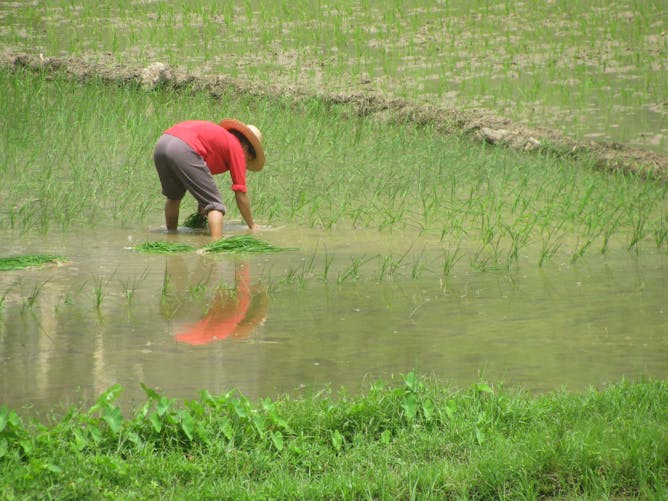|
Rice is one of the world’s key staple crops, a critical food source for more than three billion people – and it could be highly vulnerable to climate change. Kristie Ebi unpacks new research showing that rising carbon dioxide levels in the atmosphere cause rice plants to produce less of four important B vitamins, as well as protein, iron and zinc. Such changes could make some of the world’s poorest people even more vulnerable to nutrition-related problems.
And in other stories, our experts weigh up the future of Venezuela’s president, make the case for hiring bicultural employees, and explain the delicate science of football predictions.
|

Rice farmer in Longsheng, China.
kevincure
Kristie Ebi, University of Washington
As atmospheric carbon dioxide levels rise, rice plants produce fewer vitamins and other key nutrients. This could worsen hunger, malnutrition, child stunting and other diet-related health problems.
|
Arts + Culture
|
-
Emma Tarlo, Goldsmiths, University of London
In Asia, human hair is sold and recycled into products, but in the West it is treated with either disgust or veneration. A new exhibition explores our bizarre attitudes to hair.
|
|
Business + Economy
|
-
Stacey Fitzsimmons, University of Victoria; David C. Thomas, Simon Fraser University; Yuan Liao, Universidad de Navarra
Employees with more than one cultural identity can help improve an organization’s performance.
|
|
Politics + Society
|
-
Marco Aponte-Moreno, St Mary's College of California
Venezuela has freed 79 political prisoners in recent months, to global plaudits. But the hard-line regime has also charged 100 military officials with conspiracy. Does President Maduro fear overthrow?
-
Timothy Njagi Njeru, Egerton University
Kenya's new budget is expected to focus on food security, manufacturing, universal health coverage, and affordable housing.
-
Robert Mattes, University of Cape Town
President Cyril Ramaphosa’s popularity has improved the favourability of the governing ANC among South Africans.
|
|
Science + Technology
|
-
Charles MacRobert, University of the Witwatersrand
Can we trust expert football predictions? Perhaps, but it's variable.
|
|